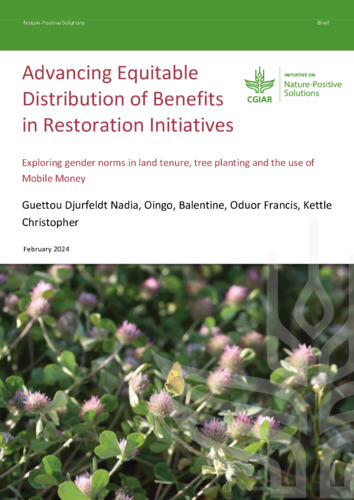Advancing equitable distribution of benefits in restoration initiatives: Exploring gender norms in land tenure, tree planting and the use of mobile money
Abstract
In Kenya, agriculture is central to most rural livelihoods. A community’s land tenure system determines access, land
ownership, and the extent of land use for agricultural purposes (UN, 2013; Mnimbo et al., 2017)12
. A common theme
in access and control over land for agricultural use is gender and the differences thereof that influence agency and
the extent to which men and women participate in agriculture (Casimir, 2021)3
.
In tree cultivation, secure access to land is prerequisite enabler for individual to engage in this activity. However,
barriers such as uncertainties related to long-term investments due to lack of land ownership disproportionately
affect women's agency in the cultivation of trees. There is thus a need to comprehend the contextually prevalent
gender norms surrounding land tenure and pathways of accessing land for women in the study communities.
While mobile money services have been talked about as a game changer for financial inclusion, their availability and
use in rural agricultural communities differ significantly based on gender and location.
This study provides insights into developing sustainable restoration practices and systems for smallholder farmers
in Siaya, Turkana, and Laikipia Counties by investigating the links between gender norms in land tenure and tree
planting practices, as well as mobile money usage for equitable benefits.

